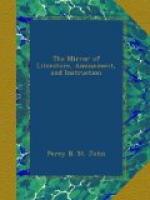the midst of the forest, which was thus introduced, appeared a gilded
tower, at the end of which stood a youth, holding in his hands a
garland of roses, as the prize of valour in a tournament which
succeeded the pageant!”
* * * * *
EPITOME OF COMETS.
(For the Mirror.)
“Hast thou ne’er seen the Comet’s flaming flight?”
Young.
Comets, according to Sir Isaac Newton, are compact, solid, fixed, and durable bodies: in one word, a kind of planets, which move in very oblique orbits, every way, with the greatest freedom, persevering in their motions even against the course and direction of the planets; and their tail is a very thin, slender vapour, emitted by the head, or nucleus of the comet, ignited or heated by the sun.
There are bearded, tailed, and hairy comets; thus, when the comet is eastward of the sun, and moves from it, it is said to be bearded, because the light precedes it in the manner of a beard. When the comet is westward of the sun, and sets after it, it is said to be tailed, because the train follows it in the manner of a tail. Lastly, when the comet and the sun are diametrically opposite (the earth being between them) the train is hid behind the body of the comet, excepting a little that appears around it in the form of a border of hair, or coma, it is called hairy, and whence the name of comet is derived.
For the conservation of the water and moisture of the planets, comets (says Sir Isaac Newton) seem absolutely requisite; from whose condensed vapours and exhalations all that moisture which is spent on vegetations and putrefactions, and turned into dry earth, may be resupplied and recruited; for all vegetables increase wholly from fluids, and turn by putrefaction into earth. Hence the quantity of dry earth must continually increase, and the moisture of the globe decrease, and at last be quite evaporated, if it have not a continual supply. And I suspect (adds Sir Isaac) that the spirit which makes the finest, subtilest, and best part of our air, and which is absolutely requisite for the life and being of all things, comes principally from the comets.
Another use which he conjectures comets may be designed to serve, is that of recruiting the sun with fresh fuel, and repairing the consumption of his light by the streams continually sent forth in every direction from that luminary—
“From his huge vapouring train perhaps
to shake
Reviving moisture on the numerous orbs,
Thro’ which his long ellipsis winds;
perhaps
To lend new fuel to declining suns,
To light up worlds, and feed th’
ethereal fire.”
THOMSON.




